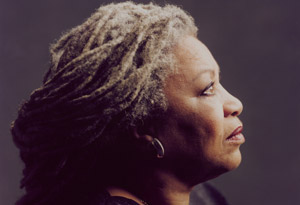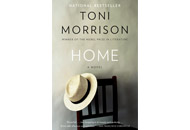Toni Morrison: The Time I Refused to Run
The Nobel Prize–winning author of Home (now in paperback) looks back on the time she faced down her greatest fear.

© Timothy Greenfield-Sanders
Two blocks. Two very, very long blocks beyond in deep darkness. It is 1953, and I have walked these blocks many times on my way to the room I rent off campus. I get off the bus after leaving the library at 10 o'clock in the evening clutching books in my arms, with a purse hanging from a strap on my shoulder.
My landlady works the night shift at the hospital, so at this hour the house will be as dark and blank as the others on this street. Everything is quiet and closed. Far ahead (or so it seems) is a streetlight. I am thinking about a paper due in a few days. What theme should I explore? Will the professor admire or dismiss it? Why are we reading Dreiser anyway?
I notice headlights coming toward me. A car is driving slowly down the street on the other side. As it passes, I glance at the driver—male, blond. I keep walking. The car slows down and stops. I hear its door slam shut. A few seconds later I hear footsteps behind me. I keep walking; I do not speed up because I don't want to call attention to myself. The walker may be going to a house nearby, visiting a friend. Besides, what would be the point of hurrying, running?
I still have to get my door key from my purse. When I reach my house, I will have to walk up stairs to the porch, fumble in the dark to insert my key in the lock. Then he will climb the steps behind me, put his right hand over my mouth, knock me down on the porch floor, scattering my books, the contents of my purse. His breath smells of mint, but there is a sour smell too. There is no one to see. He will hold me down with one hand squeezing my throat, reach under my skirt with the other and say, "Don't fight me; don't fight."
I am exhausted. The scene I have imagined is detailed, brutal and unbearable. I cannot live through what I anticipate.
I stop. I refuse to experience that imaginary assault again.
I turn around and wait for him. I wait and wait until he catches up to where I stand, with nothing to defend myself but the urgency to escape not what might happen but what has already happened in my mind.
He comes close, closer. I can see his eyes (or I think I can).
"Will you please leave me alone." It is neither question nor a scream. My voice is low, conversational. Nothing can be worse than what I have imagined.
He pauses.
"I'm not going to bother you," he whispers, then turns around and walks back to his car.
Although this encounter was important to me, it should not be understood as appropriate action for anyone else. Confronting evil can be dangerous, bloody, even fatal. Each of us responds in our own way. But for me, a young graduate student, it sealed the connection between my imagination and the source of courage.
I did not run away.
My landlady works the night shift at the hospital, so at this hour the house will be as dark and blank as the others on this street. Everything is quiet and closed. Far ahead (or so it seems) is a streetlight. I am thinking about a paper due in a few days. What theme should I explore? Will the professor admire or dismiss it? Why are we reading Dreiser anyway?
I notice headlights coming toward me. A car is driving slowly down the street on the other side. As it passes, I glance at the driver—male, blond. I keep walking. The car slows down and stops. I hear its door slam shut. A few seconds later I hear footsteps behind me. I keep walking; I do not speed up because I don't want to call attention to myself. The walker may be going to a house nearby, visiting a friend. Besides, what would be the point of hurrying, running?
I still have to get my door key from my purse. When I reach my house, I will have to walk up stairs to the porch, fumble in the dark to insert my key in the lock. Then he will climb the steps behind me, put his right hand over my mouth, knock me down on the porch floor, scattering my books, the contents of my purse. His breath smells of mint, but there is a sour smell too. There is no one to see. He will hold me down with one hand squeezing my throat, reach under my skirt with the other and say, "Don't fight me; don't fight."
I am exhausted. The scene I have imagined is detailed, brutal and unbearable. I cannot live through what I anticipate.
I stop. I refuse to experience that imaginary assault again.
I turn around and wait for him. I wait and wait until he catches up to where I stand, with nothing to defend myself but the urgency to escape not what might happen but what has already happened in my mind.
He comes close, closer. I can see his eyes (or I think I can).
"Will you please leave me alone." It is neither question nor a scream. My voice is low, conversational. Nothing can be worse than what I have imagined.
He pauses.
"I'm not going to bother you," he whispers, then turns around and walks back to his car.
Although this encounter was important to me, it should not be understood as appropriate action for anyone else. Confronting evil can be dangerous, bloody, even fatal. Each of us responds in our own way. But for me, a young graduate student, it sealed the connection between my imagination and the source of courage.
I did not run away.
 Toni Morrison is the author of Home and Beloved. She won the Nobel Prize in Literature in 1993.
Toni Morrison is the author of Home and Beloved. She won the Nobel Prize in Literature in 1993.
More from Our Favorite Authors



